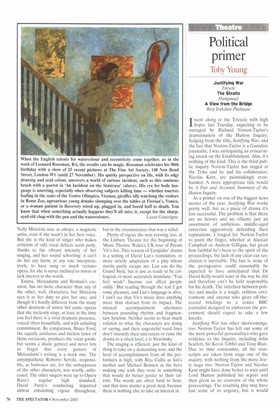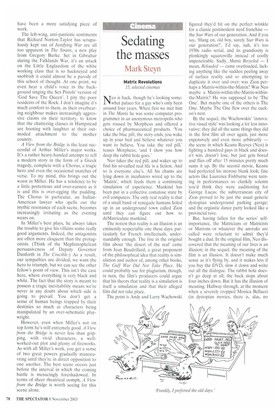Political Primer
Toby Young
Justifying War Tricycle The Straits Hampstead A View from the Bridge West Yorkshire Playhouse
T went along to the Tricycle with high
hopes last Tuesday, expecting to be outraged by Richard Norton-Taylor's dramatisation of the Hutton Inquiry. Judging from the title, Justifying War, and the fact that Norton-Taylor is a Guardian journalist, I was anticipating an eviscerating attack on the Establishment. Alas, it's nothing of the kind. This is the third public inquiry Norton-Taylor has staged at the Trike and he and his collaborator, Nicolas Kent, are painstakingly evenhanded. A more appropriate title would be A Fair and Accurate Summary of the Hutton Inquity.
As a primer on one of the biggest news stories of the year, Justifying War works pretty well, but as a piece of drama it's less successful. The problem is that there are no heroes and no villains; just an assortment of ambitious, middle-aged careerists aggressively defending their reputations. I longed for Norton-Taylor to point the finger, whether at Alastair Campbell or Andrew Gilligan, but given how faithful he's been to the spirit of the proceedings, the lack of any clear-cut resolution is inevitable. The fact is, none of the protagonists could reasonably be expected to have anticipated that Dr David Kelly would react in the way he did and therefore can't be held responsible for his death. The interface between politics and media is a tough, ruthless environment and anyone who gives off-therecord briefings to a senior BBC journalist designed to embarrass the government should expect to take a few knocks.
Justifying War has other shortcomings, too. Norton-Taylor has left out some of the most powerful personalities who gave evidence to the Inquiry, including John Scarlett, Sir Kevin Tebbit and Tony Blair. Due to time constraints, all the transcripts are taken from stage one of the inquiry, with nothing from the more lively stage two. Norton-Taylor and Nicolas Kent might have done better to wait until Lord Hutton published his report and then given us an overview of the whole proceedings. The resulting play may have lost some of its urgency, but it would have been a more satisfying piece of work.
The left-wing, anti-patriotic sentiments that Richard Norton-Taylor has scrupulously kept out of Justifying War are all too apparent in The Straits, a new pla!, from Gregory Burke. Set in Gibraltar during the Falklands War, it's an attack on the Little Englandism of the white working class that is so hackneyed and snobbish it could almost be a parody of this school of thought. At one point, we even hear a child's voice in the background singing the Sex Pistols' version of 'God Save The Queen'. I pity the poor residents of the Rock. I don't imagine it's much comfort to them, as their overbearing neighbour makes increasingly aggressive claims on their territory, to know that the chattering classes in Hampstead are hooting with laughter at their outmoded attachment to the mother country.
A View from the Bridge is the least successful of Arthur Miller's major works. It's a rather heavy-handed attempt to tell a modern story in the form of a Greek tragedy, complete with a Chorus, a tragic hero and even the occasional snatches of verse. To my mind, this brings out the worst in Miller. He has a tendency to be a little portentous and over-earnest as it is and this is over-egging the pudding. The Chorus in particular, an ItalianAmerican lawyer who spells out the mythic resonance of each scene, becomes increasingly irritating as the evening wears on.
In Miller's best plays, he always takes the trouble to give his villains some really good arguments. Indeed, the antagonists are often more eloquent than the protagonists. (Think of the Mephistophelean persuasiveness of Deputy Governor Danforth in The Crucible.) As a result, our sympathies are divided; we want the hero to triumph, but we can see the other fellow's point of view. This isn't the case here, where everything is very black and white. The fact that the story is meant to possess a tragic inevitability means we're never in any doubt about which side is going to prevail. You don't get a sense of human beings trapped by their destinies so much as characters being manipulated by an over-schematic playwright.
However, even when Miller's not on top form he's still extremely good. A View from the Bridge is never less than gripping, with vivid characters, a wellworked-out plot and plenty of fireworks. As with all Miller's work, you get a sense of two great powers gradually manoeuvring until they're in direct opposition to one another. The best scene occurs just before the interval in which the coming battle is menacingly foreshadowed. In terms of sheer theatrical oomph, A View from the Bridge is worth seeing for this scene alone.



































































































 Previous page
Previous page